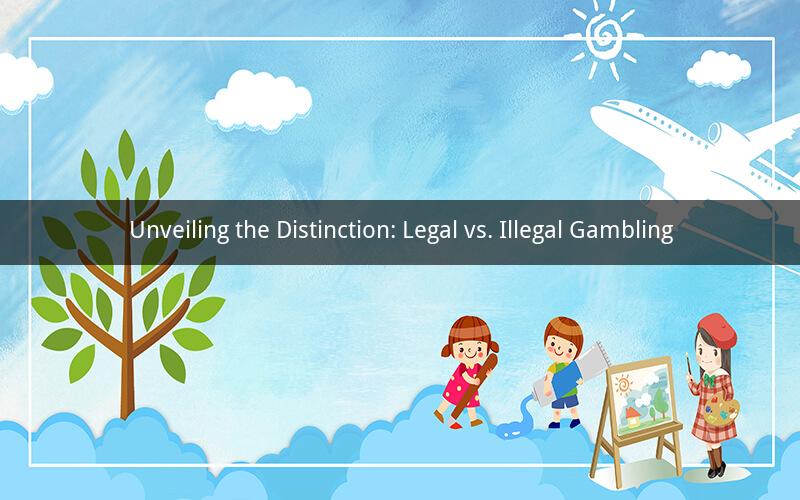
Introduction:
Gambling has been a topic of great interest and debate for centuries. With the rise of online platforms and the proliferation of casinos, it has become increasingly important to understand the difference between legal and illegal gambling. This article aims to shed light on the key distinctions between the two, exploring the legal frameworks, potential risks, and societal impacts associated with each.
1. Legal Gambling:
Legal gambling refers to the practice of betting or wagering on games or events that are permitted by the laws and regulations of a particular jurisdiction. This includes various forms of gambling, such as sports betting, lottery, casino games, poker, and horse racing. Here are some key aspects of legal gambling:
a. Licensing and Regulation: Legal gambling establishments are required to obtain licenses from the relevant authorities. These licenses ensure that the operators adhere to strict regulations, including fair play, responsible gambling practices, and the prevention of fraud.
b. Taxation: Legal gambling generates significant revenue for governments. Operators are often required to pay taxes on their profits, which can be used for public services and infrastructure development.
c. Consumer Protection: Legal gambling platforms prioritize the safety and well-being of their customers. They provide resources for responsible gambling, such as self-exclusion programs, deposit limits, and counseling services.
2. Illegal Gambling:
Illegal gambling refers to the practice of betting or wagering on games or events that are prohibited by the laws and regulations of a particular jurisdiction. This can include both offline and online gambling activities. Here are some key aspects of illegal gambling:
a. Lack of Regulation: Illegal gambling operators operate without the necessary licenses or oversight. This lack of regulation can lead to unfair practices, fraud, and the exploitation of vulnerable individuals.
b. Illegal Proceeds: Illegal gambling generates significant revenue for organized crime and other illegal activities. This funding can be used to finance further criminal activities, including drug trafficking and money laundering.
c. Consumer Vulnerability: Illegal gambling platforms often lack the resources and measures to protect consumers. This can result in financial losses, addiction, and other negative consequences.
3. The Impact of Legal and Illegal Gambling:
The distinction between legal and illegal gambling has significant implications for society. Here are some key points to consider:
a. Economic Impact: Legal gambling contributes positively to the economy by generating revenue, creating jobs, and supporting local businesses. On the other hand, illegal gambling diverts funds away from legitimate businesses and can lead to economic instability.
b. Public Safety: Legal gambling establishments are subject to strict regulations, including background checks and age verification. Illegal gambling platforms, however, pose a higher risk of involvement in criminal activities and can lead to increased crime rates.
c. Consumer Protection: Legal gambling platforms prioritize the safety and well-being of their customers, providing resources for responsible gambling and preventing addiction. Illegal gambling platforms often lack such measures, leading to potential harm to individuals and communities.
4. Challenges in Distinguishing Legal from Illegal Gambling:
Identifying the difference between legal and illegal gambling can be challenging due to several factors:
a. Technological Advancements: The rapid development of technology has made it easier for illegal gambling operators to operate online, making it difficult to track and regulate their activities.
b. Cross-border Gambling: The internet allows individuals to access gambling platforms from different jurisdictions, leading to complex legal issues and challenges in enforcing gambling laws.
c. Gray Areas: There are certain activities that may fall into a gray area, where the legality is not entirely clear. This requires careful interpretation and assessment by legal authorities.
5. Questions and Answers:
Q1: Can legal gambling platforms operate without a license?
A1: No, legal gambling platforms are required to obtain licenses from the relevant authorities to ensure compliance with regulations and consumer protection measures.
Q2: Is online gambling always illegal?
A2: No, online gambling can be legal depending on the jurisdiction. Some countries have implemented regulations allowing online gambling, while others have banned it entirely.
Q3: Can illegal gambling platforms offer better odds than legal ones?
A3: No, illegal gambling platforms often lack the necessary resources and oversight to ensure fair play and odds. Legal gambling platforms are required to adhere to strict regulations to ensure transparency and fairness.
Q4: Is it illegal to play poker with friends at home?
A4: The legality of playing poker with friends at home varies depending on the jurisdiction. In some places, it may be considered illegal if it involves betting or wagering money.
Q5: Can legal gambling platforms be associated with criminal activities?
A5: While legal gambling platforms are subject to strict regulations, there have been instances where some operators have been involved in illegal activities. However, the presence of regulations and oversight helps mitigate such risks.
Conclusion:
Understanding the difference between legal and illegal gambling is crucial for individuals, governments, and society as a whole. Legal gambling provides a regulated and controlled environment that promotes responsible gambling and generates revenue for public services. On the other hand, illegal gambling poses significant risks, including financial losses, addiction, and involvement in criminal activities. By distinguishing between the two, we can work towards creating a safer and more regulated gambling landscape.